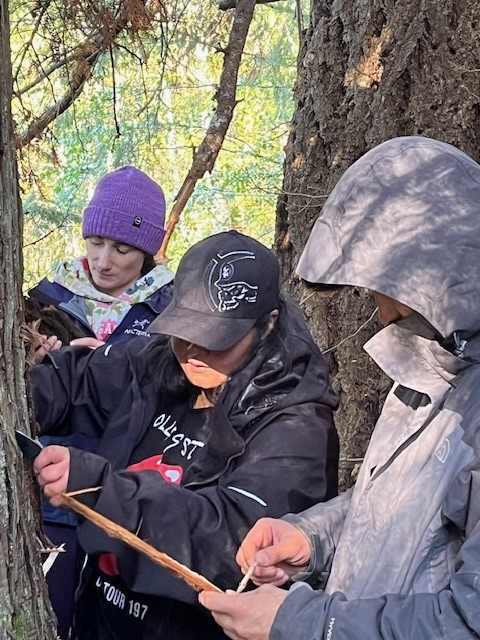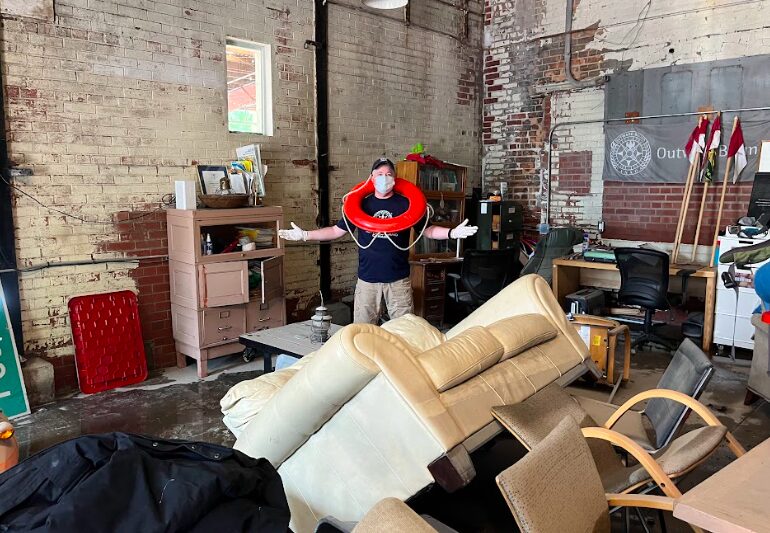If you’ve ever watched your students light up during a field trip or outdoor activity, you already know: something special happens when learning moves beyond four walls. The Nature Education Collective (NEC) was created to make that spark more accessible for teachers across Canada.
By providing educators with training, resources, and community support, NEC Lead Teacher Training Workshops help them build the skills and confidence to bring meaningful outdoor learning into everyday practice.
Recently, Outward Bound Canada (OBC) instructors Kat Wood and Brandon Boltz facilitated two NEC workshops in collaboration with our partners in Winnipeg, MB, and Cochrane, AB. Read on to learn what these workshops look like, why they matter, and how they can transform both teaching practice and student well-being.
What is the Nature Education Collective?
The NEC is a coalition of five leading outdoor/conservation organizations—Outward Bound Canada, Earth Rangers, Canadian Wildlife Federation, Ducks Unlimited Canada, and Project Learning Tree Canada—committed to improving access to quality, nature-based education for young people across Canada.
The NEC’s vision is to inspire a generation of students who are:
- Environmentally literate
- Emotionally resilient
- Confident and motivated to take action for nature
To achieve this, the NEC offers one- to three-day workshops for teachers that combine the topics of climate, biodiversity, and social-emotional learning. The result is a training model that equips teachers with both a comprehensive understanding and practical tools for the classroom.
NEC Workshop Offerings
- Self-Selected Teacher Training – A one-day, in-person workshop facilitated by Outward Bound Canada
- Lead Teacher Training – A three-day collaborative workshop delivered by all five partner organizations
A Day in the Life of an NEC Workshop
A typical Lead Teacher Training spans three days and follows a rotation model. Each of the five partner organizations lead sessions lasting 15 minutes to an hour throughout the day. “We weave a variety of topics into a cohesive theme,” Kat explains. By the end of the day, participants don’t just have a collection of activities to bring back to their classrooms, they also see how all the pieces fit together.
The days often consist of morning and afternoon learning blocks, with opportunities for hands-on practice, reflection, and discussion. The combination of structure and flexibility means that each workshop can be adapted to the needs of the specific group.
Who Attends NEC Workshops?
The Lead Teacher Trainings are designed for a diverse range of educators. They are open to kindergarten through grade 12 teachers in school districts partnered with the NEC, and school administrators are also encouraged to join.
Brandon noted that many of the 26 teachers who attended the Cochrane workshop were new to hands-on outdoor experiences. “Part of the training is about helping teachers feel more comfortable and confident bringing their students into outdoor spaces,” he explains, emphasizing that participants don’t have to be experts in wilderness survival. Any teacher who is interested in outdoor education can start small and make it work.
Workshops are usually attended by 20 to 30 educators, which creates an intimate setting where participants can build community and share ideas.
Passion Meets Practicality
Kat noticed that educators arrive at the NEC workshops with a clear passion for getting their students outdoors, but also full of concerns, such as limited budgets, resistance from school administrators, safety, and logistical challenges.
Rather than dampening enthusiasm, these concerns fuel brainstorming. “It becomes, okay, so how do we make this work?” Kat said.
Workshops balance big-picture inspiration with practical problem solving. Teachers receive curriculum-linked manuals filled with ready-to-use activities, and work with peers to troubleshoot challenges. This peer-to-peer exchange is one of the most empowering aspects. “A group of second-grade teachers will always know their students’ needs better than I ever could. We just provide the structure and space for them to share and adapt ideas together,” says Kat.
Outward Bound Canada’s Role
Outward Bound Canada’s sessions draw heavily on its experiential education model, built around four key components:
- Creating a course container – setting expectations, building group agreements, and creating a safe environment for learning.
- Risk management – addressing practical considerations when moving learning outdoors, from boundaries and weather to supervision strategies.
- Experiential learning – going beyond theory by using hands-on outdoor experiences to engage students and enhance learning.
- Facilitation and Processing – guiding students to process what they learned through structured reflection.
Teachers practiced these methods firsthand, using lessons and activities from their own classrooms across science, math, language arts, and physical education. A key focus of the OBC-led sessions was on social-emotional learning and group process, giving teachers practical strategies for student group management in outdoor settings. Brandon recalled many of the “aha” moments came from realizing how accessible and cross-curricular outdoor learning can be. “Teachers would say things like, ‘Oh, I could do this lesson outside! You’re right. I don’t know why I’ve been doing this inside.’”
Teachers also received printed resources, including OBC’s Training Academy Outdoor Leaders Handbook and curriculum-linked workbooks from Earth Rangers, the Canadian Wildlife Federation and Project Learning Tree. These references extend learning beyond the workshop itself. “You can only absorb so much over three days, so having a resource to revisit later makes a big difference,” adds Brandon.
Belonging, Resilience, and Emotional Regulation
Perhaps the most powerful outcomes of the NEC workshops go beyond curriculum. Both Kat and Brandon highlight how outdoor learning supports student well-being, resilience, and social-emotional growth in several key ways:
- Belonging: When students feel safe and connected in their group, they’re more willing to take on challenges outdoors.
- Scaffolding: By layering skills and challenges gradually, teachers set students up for repeated success, which builds confidence and resilience.
- Emotional Regulation: Both teachers and students learn to recognize stress levels, balancing healthy challenges with moments of rest and reflection.
“Ultimately, it’s about creating opportunities for students to take on a challenge, recover, and reflect on their learning before moving on. This approach helps students build resilience while deepening their learning,” explains Kat.
The Ripple Effect
The potential impact of the NEC workshops stretches far beyond a single classroom. As Brandon put it: “Teachers may only have a limited number of hours with their students each day, but those moments are full of potential. If they can spend more of that time outside, there will be the ripple effect of more youth being confident and caring about the outdoors, finding themselves in it naturally, and sharing it with their family and friends.”
When teachers feel confident outdoors, they not only enrich student learning but also encourage students to embrace nature in their own lives. The result is a generation of environmentally literate, emotionally resilient youth who are confident and motivated to take action for the planet.
Why Educators Should Get Involved
For teachers across Canada, NEC workshops are a chance to:
- Gain curriculum-linked outdoor teaching strategies
- Build confidence and comfort with teaching outdoors
- Access ready-to-use resources
- Connect with a supportive network of peers
- Foster student and teacher well-being and resilience
As Brandon and Kat’s experiences show, outdoor learning doesn’t require reinventing the wheel. It starts with taking what you already teach, stepping outside, and letting nature enhance the experience.
When is the Next NEC Workshop?
On October 18, Outward Bound Canada is hosting a one-day Self-Selected Teacher Training: Facilitating Social-Emotional Learning in the Outdoor Classroom. This hands-on, interactive program gives teachers the opportunity to explore group management, facilitation, and leadership tools for engaging outdoor experiential learning. Be prepared to spend the day outdoors!
- Audience: K-12 Teachers
- Format: In person
- Duration: Full day
- Dates: Saturday Oct 18, 2025
- Location: Camp Jubilee, Cochrane, AB
- Registration Link: https://obctrainingacademy.campbrainregistration.com/Landing
- (Hint: click Workshops and Certification Courses 2025, then Nature Ed Collective, Calgary – Teacher Training)
The Outward Bound Canada Training Academy also offers three online micro-credentials in Risk Management, Judgment and Decision-Making; Diversity, Equity, and Inclusion; and Environmental Leadership. All three are accredited by Nipissing University.
- Audience: K-12 Teachers
- Format: Virtual
- Duration: 2 hours per course
- Dates: Ongoing
- Registration Link: https://natureducation.ca/upcoming-events/
The workshops are open to all educators from NEC partner school districts and no prior experience is required. Those who have attended a three-day workshop can treat it as an extension, while newcomers are equally welcome!
Stay tuned for upcoming workshops in the Niagara region and Winnipeg.







